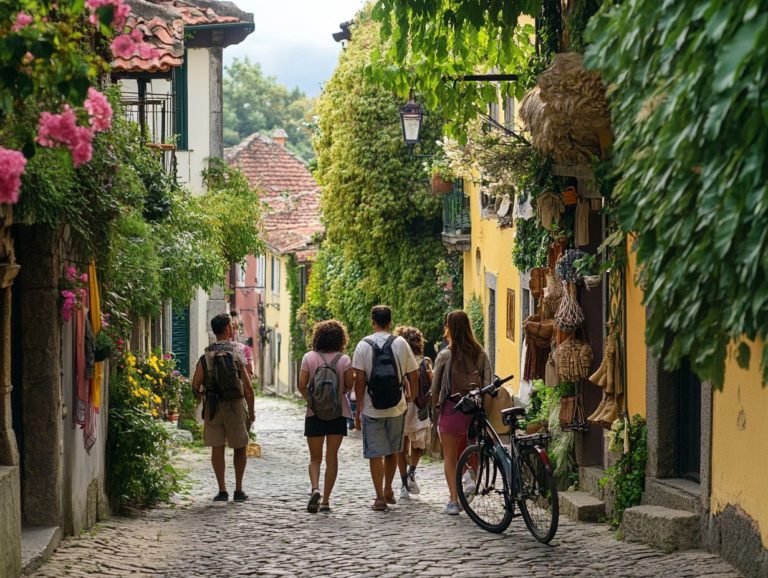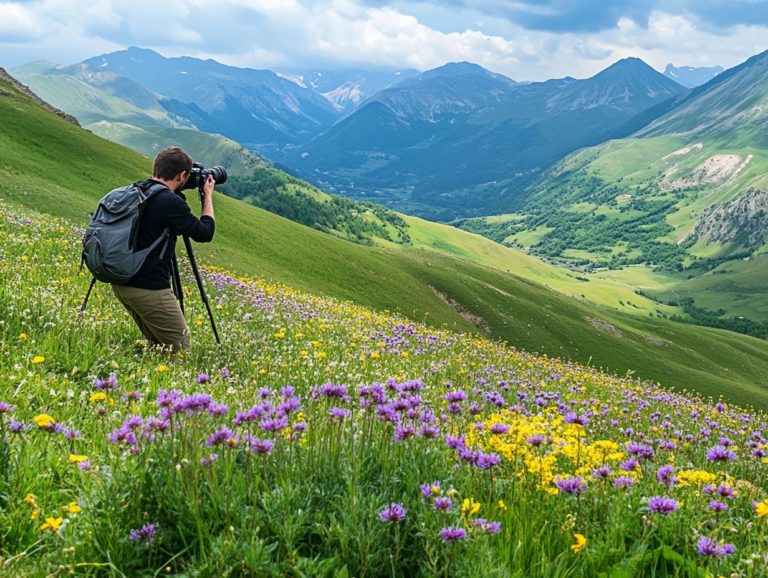Eco-Conscious Trekking: Tips for Sustainable Hiking
In a world that s becoming more attuned to environmental challenges, sustainable hiking provides a refreshing opportunity for you to explore nature while keeping your ecological footprint in check.
Get ready to embrace a hiking experience that not only rejuvenates your spirit but also nurtures the planet. This guide will walk you through the essentials of eco-conscious trekking, covering everything from the core principles to planning your next adventure with the right gear and trail selections.
Discover the wonders that come with adopting sustainable practices, along with the ethical considerations necessary to respect local communities.
Contents
Key Takeaways:
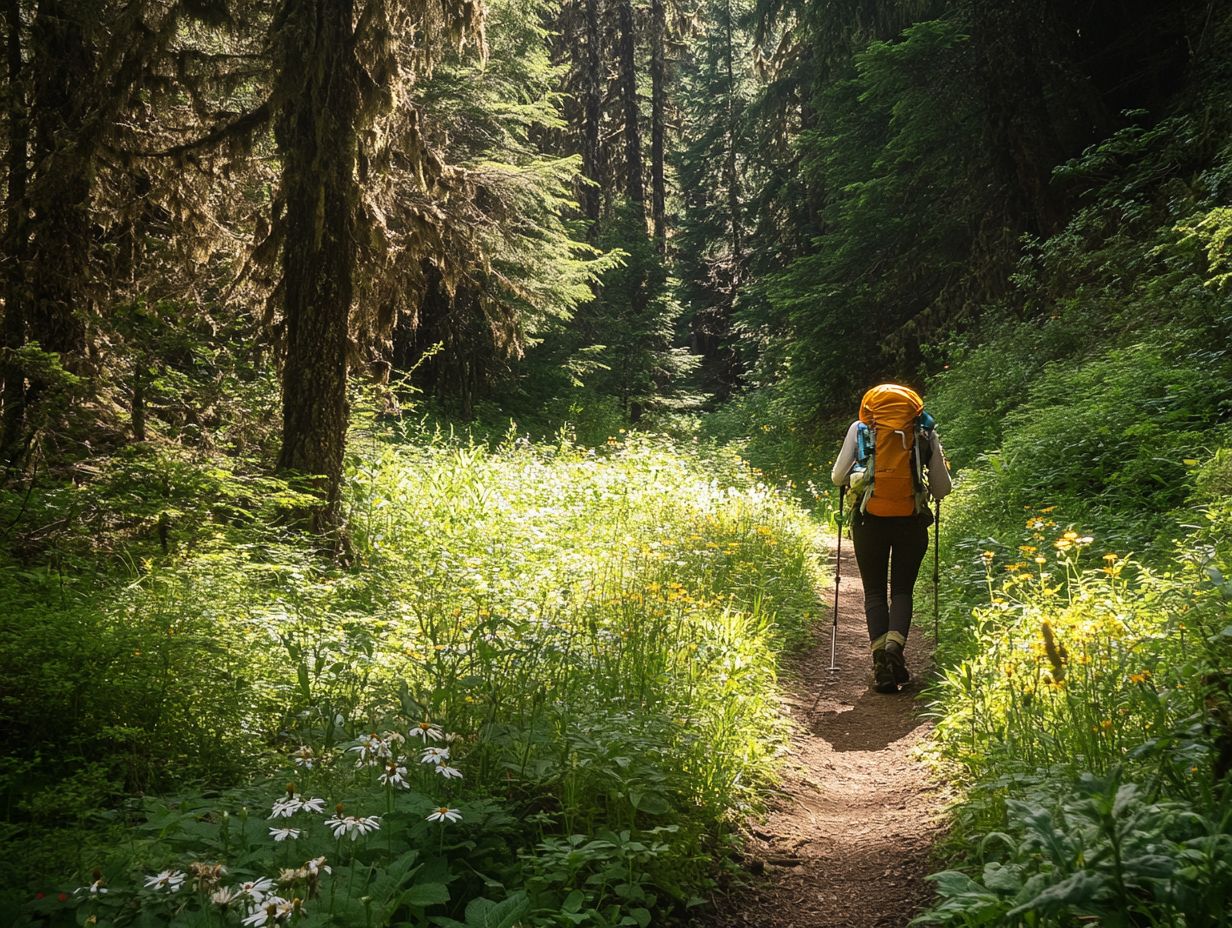
- Choose sustainable hiking! It helps lessen your impact on the environment and preserves nature for future generations.
- Plan and prepare for eco-friendly hiking by selecting the right trail and gear. Practice Leave No Trace principles this means leaving the environment as you found it by taking all trash and being responsible.
- Show respect for local communities and cultures while trekking. Support sustainable tourism initiatives that contribute to conservation efforts.
Understanding Sustainable Hiking
Sustainable hiking is not just a trend; it s a refined approach that highlights the significance of eco-friendly practices. This enables you to immerse yourself in nature while minimizing your environmental footprint.
By embracing sustainable hiking tips, you play a vital role in preserving natural ecosystems. You can ensure that hiking trails remain accessible for those who come after you. Grasping the principles of eco-friendly hiking such as respecting wildlife and reducing waste is crucial for cultivating a community dedicated to caring for the environment.
Your choices can make a lasting impact, allowing everyone to enjoy the great outdoors responsibly.
What is Eco-Conscious Trekking?
Eco-conscious trekking is all about immersing yourself in outdoor adventures while being mindful of the environment. It s an approach that not only promotes sustainable practices but also emphasizes minimizing harm to our precious natural habitats.
This mindset encourages you to truly appreciate the beauty of nature while actively contributing to its preservation. By choosing biodegradable products, you can significantly lessen the impact you have on pristine landscapes. Sustainable food choices matter too; opting for locally sourced meals can cut down on the carbon footprint tied to transportation.
Understanding the importance of leaving no trace is vital remember to take only photographs, leave only footprints, and ensure that the natural environment remains unspoiled for future adventurers. These principles are at the heart of responsible trekking, guiding you to enjoy the outdoors while protecting it for generations to come.
Benefits of Sustainable Hiking
Sustainable hiking presents a wealth of advantages that transcend mere personal enjoyment; it actively enhances the environment and encourages healthier lifestyles among outdoor enthusiasts. By adopting sustainable hiking practices, you can dramatically lower your carbon footprint, protect local wildlife, and cultivate a profound appreciation for the natural world.
The dual rewards of caring for the environment and personal well-being render sustainable hiking a critical pursuit for all adventurers in search of enriching outdoor experiences.
Environmental and Personal Benefits
The environmental benefits of sustainable hiking are impressive, encompassing the preservation of natural habitats and a deep respect for wildlife. On a personal level, the advantages often center around enhanced health and well-being.
By choosing public transportation to reach trailheads, you can significantly reduce your carbon footprint. This plays a vital role in tackling issues like air pollution. Carpooling or taking the bus not only decreases the number of vehicles on the road but also cultivates a sense of community among fellow hikers, enriching your experience.
Making these eco-friendly choices allows you to savor the journey just as much as the destination. It often leads to the discovery of scenic routes and hidden gems along the way. This harmonious blend of caring for the environment and personal fitness through walking or biking to trails epitomizes a lifestyle that thrives in sync with nature.
Join us in making a difference! Start planning your next sustainable hike today!
Planning for Sustainable Hiking
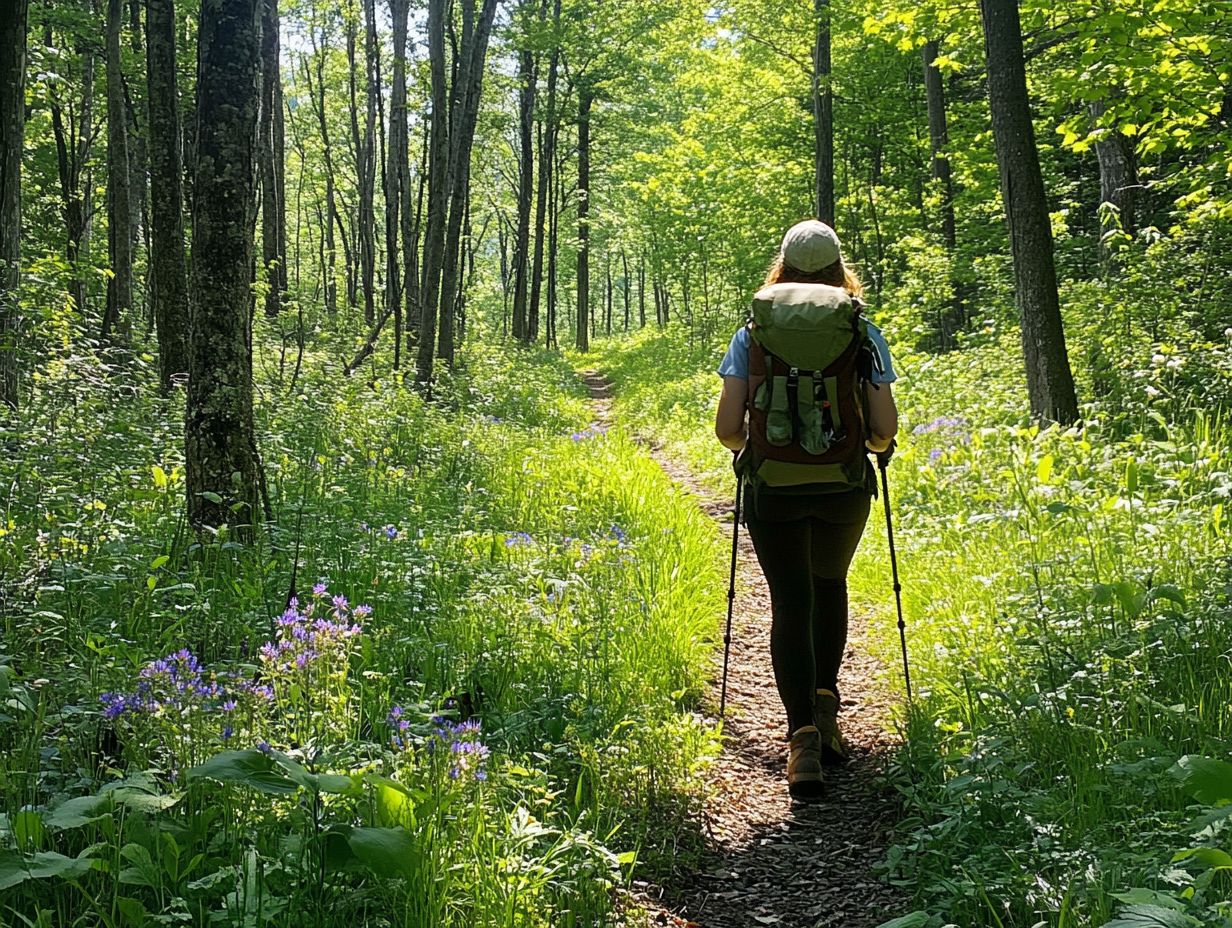
Planning for sustainable hiking requires meticulous attention to detail. Ensure that your outdoor experience is both responsible and enjoyable. Choose designated trails to protect our beautiful landscapes and minimize your environmental impact.
Consider the gear and resources you use during your adventures. This thoughtful approach to hiking preparation not only enhances your experience but also plays a vital role in preserving our precious natural ecosystems.
Choosing the Right Trail and Gear
Choosing the right hiking trail and appropriate outdoor gear is essential for a sustainable hiking experience. Assess the environmental impact of both the terrain and your equipment.
When selecting trails, consider their ecological footprint, which is the effect of our actions on the environment. Think about factors like wildlife habitats and native plant life that could be disrupted by foot traffic.
Sticking to established paths minimizes erosion and protects delicate ecosystems. This is an important aspect of responsible outdoor activities.
Using sustainable gear such as biodegradable soaps, reusable water bottles, and eco-friendly clothing can significantly lower your individual carbon footprint. These hiking essentials enhance your outdoor experience while helping to preserve natural resources.
By making informed choices about both trails and equipment, you contribute to the longevity of our cherished wilderness areas.
Practicing Leave No Trace Principles
Embracing Leave No Trace principles is crucial for minimizing your impact on the environment during outdoor adventures. This ensures that nature remains unspoiled for generations to come.
Follow guidelines like properly disposing of waste, respecting wildlife, and managing your campfire footprint. These practices cultivate a culture of environmental stewardship that champions responsible recreation.
Such mindful actions elevate your hiking experience and play a significant role in preserving our natural landscapes.
Minimizing Impact on the Environment
Minimizing your impact on the environment involves embracing practices that honor wildlife and opting for biodegradable products to reduce waste on your hiking journeys.
Use reusable containers and utensils for your meals and snacks. This not only cuts down on single-use plastic but also enhances your outdoor experience.
When planning your hike, stay on designated trails to protect local ecosystems and habitats.
Be aware of the wildlife around you to help maintain the balance of nature. Educate yourself about the species in the area, and avoid leaving food scraps that might attract animals.
By integrating these mindful strategies into your outdoor adventures, you can relish the beauty of nature while ensuring it remains unspoiled for generations to come.
Ethical Considerations for Hikers
Ethical considerations are paramount for you as a hiker. Navigate the delicate balance between enjoying nature and honoring the local communities and their cultures.
By adopting sustainable practices, you can significantly reduce your environmental impact while cultivating meaningful relationships with the communities you visit.
Grasping the ethics of outdoor activities is crucial for promoting responsible recreation and deepening your appreciation for the natural world.
Respecting Local Communities and Cultures
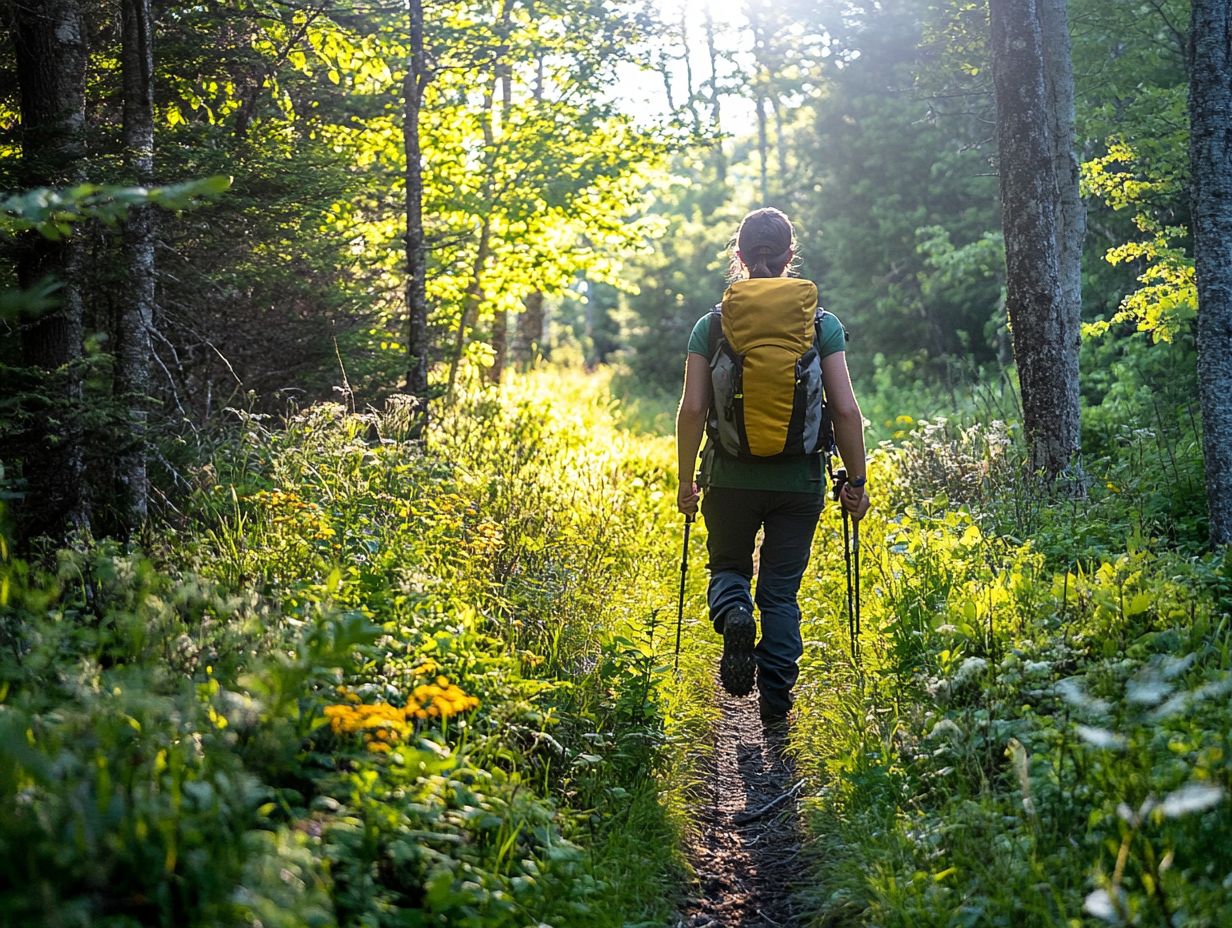
Respecting local communities and cultures is an essential principle of hiking ethics that elevates your outdoor experience while safeguarding cultural heritage.
As a hiker, engaging with local communities opens valuable opportunities to learn about and appreciate the customs and traditions that define the region. This understanding enriches your journey and nurtures positive relationships, paving the way for shared stories and mutual respect.
Participating in responsible outdoor activities such as volunteering for local trail clean-ups or attending cultural festivals forges connections that go beyond individual adventures.
Being mindful of community guidelines and traditions can significantly lessen your environmental impact while promoting sustainable tourism through hiking planning, ultimately benefiting both the ecosystem and the local populace.
Supporting Sustainable Tourism
Supporting sustainable tourism helps protect beautiful natural landscapes and enhances conservation efforts within the hiking community. By getting involved in eco-friendly tourism initiatives and engaging with local conservation projects, you can make a meaningful impact on environmental stewardship.
This dedication elevates your hiking experience and cultivates a strong sense of community and responsibility toward the ecosystems you cherish.
Ways to Contribute to Conservation Efforts
You have countless opportunities to contribute to conservation efforts as a hiker. Whether it s through participating in trail maintenance or supporting local organizations dedicated to outdoor sustainability, every effort counts.
Engaging in hands-on activities like organized clean-up events or restoring native habitats plays a crucial role in preserving the stunning beauty of hiking trails. Many outdoor advocacy groups offer volunteer opportunities that enable you to give back while enjoying the great outdoors.
Consider donating to local environmental nonprofits committed to protecting natural resources or collaborating with them on various projects.
You can also promote sustainable practices by following Leave No Trace principles and raising awareness in your community about the importance of preserving nature for future generations.
Frequently Asked Questions
What is eco-conscious trekking?
Eco-conscious trekking is the practice of hiking in a way that minimizes harm to the environment and promotes sustainability. It involves being mindful of your impact on the natural surroundings while hiking.
Why is eco-conscious trekking important?
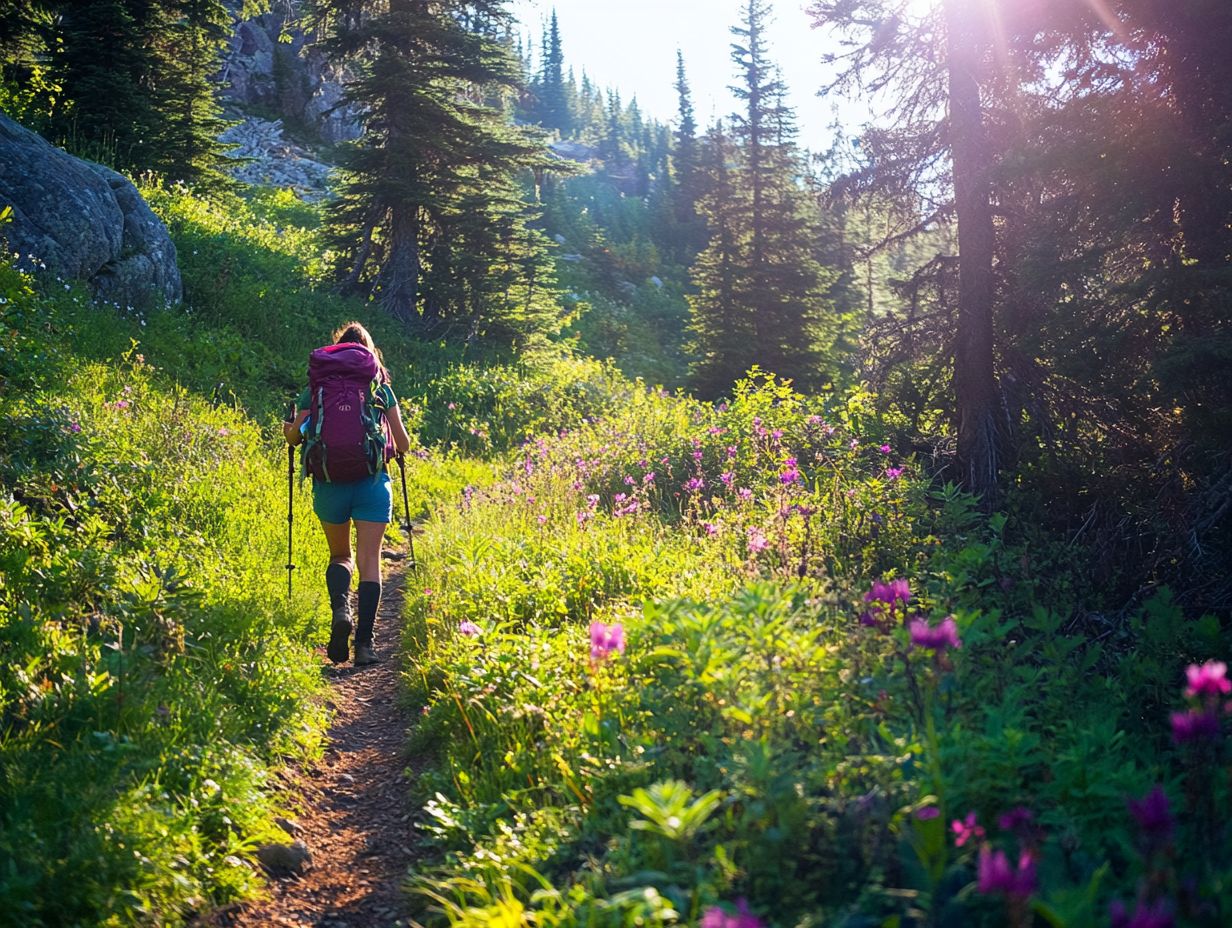
Eco-conscious trekking is crucial because it helps preserve the natural environment for future generations. It promotes responsible travel and supports the local economy and cultural preservation of the areas being trekked.
What are some tips for eco-conscious trekking?
Some valuable tips for eco-conscious trekking include packing out all trash, using biodegradable products, staying on designated trails, and avoiding single-use plastics.
How can I reduce my impact on the environment while trekking?
To minimize your environmental impact while trekking, bring a reusable water bottle, use a portable water filter instead of buying bottled water, and choose eco-friendly transportation options to reach the trailhead.
What should I do if I encounter wildlife while trekking?
If you encounter wildlife, maintain a safe distance and avoid disturbing them. Do not feed or approach the animals, and always follow Leave No Trace principles.
How can I support local communities while eco-conscious trekking?
You can support local communities by staying in locally-owned accommodations, buying locally-made products, and hiring local guides. This approach boosts the local economy and promotes cultural preservation.


